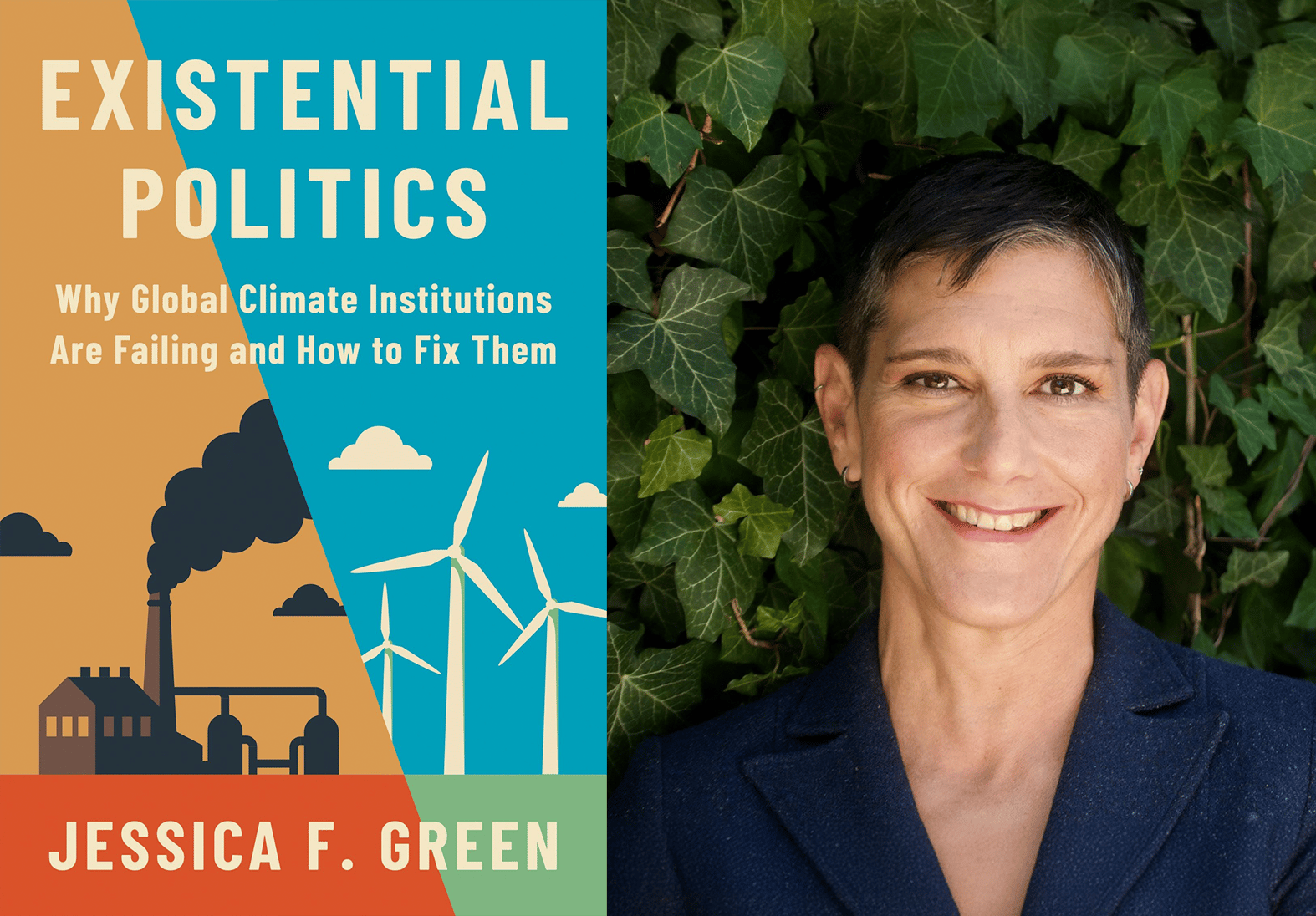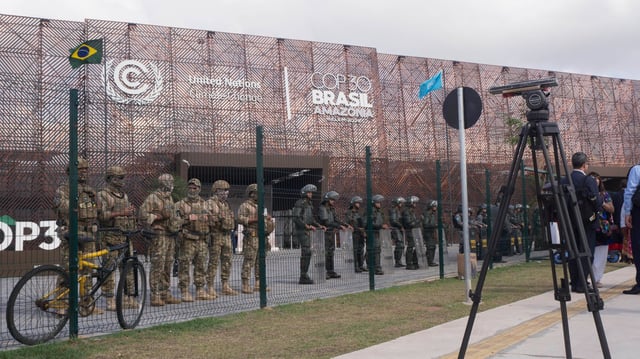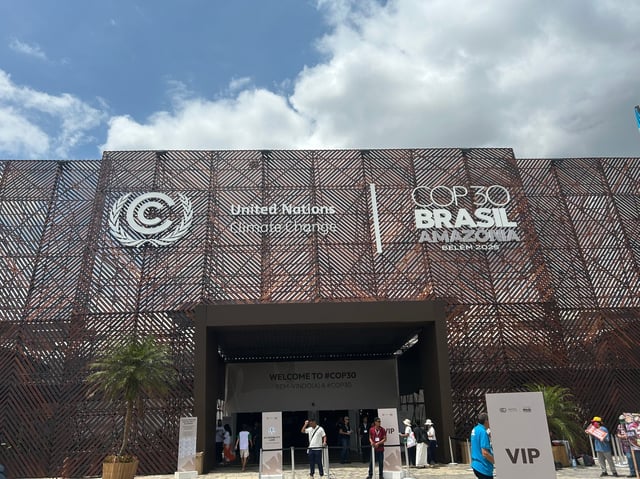
This month, tens of thousands of people—among them diplomats and climate negotiators, industry representatives and management consultants, public relations operatives and other corporate hangers-on—have passed through Belém, Brazil, for the annual UN climate conference, or COP30, which kicked off in early November.
The outcome of the gathering is always fairly predictable. UN executives will announce that while some progress was made, more work remains. Participating countries will issue pledges and promises, usually alongside big numbers and smaller amounts of actual funding. Meanwhile, corporate talking heads, many representing the industries responsible for both creating the problem and obstructing efforts to solve it, will post statements about cooperation and market-based solutions and green investing, while making precisely zero changes to how they operate. (This seems to be the “zero” in “net zero.”)
The COP is in its fourth decade. If it were capable, in its current form, of achieving its stated aim of tackling climate change, it would probably have done so by now. So why isn’t it working? How is it possible that so much fanfare, so many words, and so much work—much of it genuine and good-faith—has amounted to such little progress?
University of Toronto political science professor Jessica F. Green has some ideas. In Existential Politics: Why Global Climate Institutions Are Failing and How to Fix Them, the longtime observer of global climate negotiations and expert on carbon accounting argues that the COP embodies a “win-win” approach to a problem for which someone has to lose. The challenge, then, is to make sure the right people (and planet) do the winning, while the “fossil asset owners,” as Green describes them, do the losing.
In this conversation with Drilled, Green explains how the consultant-driven cottage industry promising to help companies track and measure their emissions has emerged as an obstacle to real progress; why wealth taxes still contribute to climate justice even if the revenue they raise isn’t used for climate measures; and, of course, why head-on conflict with the fossil fuel industry—rather than feel-good cooperation—is a prerequisite for tackling the climate crisis.
The conversation below has been condensed and edited significantly for clarity and accuracy.
For the full, extended conversation, check out the podcast version of this interview:
Could [you] define what “existential politics” are and talk about how they differ from regular politics?
Many people say, “This is a collective action problem, and we all have to cooperate to reduce emissions.” What I saw as a student of climate politics over many, many years is that this is really a distributional problem. This is about who gets what, when, and how. The idea of, “If we all just cooperate…” was, it seemed to me, looking at the wrong problem. We need to wake up to the fact that we’re largely thinking about this the wrong way.
I define existential politics as a political contest between different kinds of asset owners: fossil asset owners, vulnerable asset owners, and green asset owners. Fossil asset owners are obviously fossil fuel companies, mining companies, heavy industry—all of the high-emitting industries that are the foundations of our economy. Green asset owners are precisely what you would think they would be: the engines of the decarbonized economy. Producers of EVs, solar PV [photovoltaic] cells, wind turbines, all the infrastructure we need to run those. Vulnerable asset owners are those whose assets will be destroyed by the effects of climate change.
The basic idea of the book is that we have this profound asymmetry [in] that fossil asset owners are running the show. They have been for decades. Saying, “We’re all in this together if we just cooperate!” is ignoring the elephant in the room, which is these very powerful interests that have a vested interest in maintaining the value of their assets.
The reason that I say that it’s existential is, it’s not just about who gets what, but whose assets become completely worthless, whose houses disappear, whose livelihoods disappear, which countries disappear as a result of both climate policies and the effects of climate change. Unless we grapple with the visceral reactions that that is going to provoke in people, then we’re not going to make much progress.
The title of the first chapter is very direct: “We are not all in this together.” That gets at the heart of what you’re saying, which is that this is ultimately a question of power and power asymmetries, right now tilted very heavily in favor of fossil asset owners and against vulnerable and green asset owners.
[I’m] a longtime observer of climate politics: the UNFCCC, the Framework Convention on Climate Change; then subsequently the Kyoto Protocol; now the Paris Agreement. The Framework Convention was signed in 1992. It was the heyday of the “liberal international order.” We were writing environmental treaties left and right. Humanitarian intervention was a thing that we did, for better or for worse. The WTO was expanding. There was a lot of international cooperation. And that’s when we started, as a global community, working on climate.
It began in this moment where it was like, “We can all cooperate!” It ignored the fact that as early as the 1990s, before the Framework Convention was even inked, the fossil fuel industry was already generating disinformation around the science of climate change. That’s been well documented. The argument here is, you cannot collaborate with obstructionists. There is this very long tradition of obstructionism. Until we realize that, we’re just sort of fiddling at the margins.
It seems like it describes the status quo approach of some of these elite global institutions: “fiddling at the margins” in a way that doesn’t try to tackle the fundamental political dynamics.
Look, I think it’s worth saying that the world has changed a lot, and the climate crisis has changed a lot. In 1992, somewhere between 180 and 190 countries quickly signed the Framework Convention. It doesn’t require a huge amount from countries other than starting to take stock of what their emissions are and cooperating on science. These kinds of things. It seemed like there was some consensus—and, also, the climate crisis was far away. Arguably, some of the politics weren’t existential then. There could be winners and losers, but the losers maybe wouldn’t lose as much or as quickly.
But now that we’ve repeatedly kicked the can down the road, we’re in a sort of do-or-die moment. Those changes become more precipitous, the costs become steeper, and therefore the politics more conflictual.
One of the ways we’ve kicked the can down the road is what you describe as “[managing] tons.” Can you give an overview of [what] types of “solutions” that encompasses?
We have this very narrow construction of the climate problem as a technical problem of measuring, verifying, and accounting for carbon emissions. It’s this very narrow focus on measurement and buying and selling and making claims about the level of emissions. Measuring emissions is actually, in many ways, very difficult. We know how much energy is embedded in a ton of coal or fossil fuels, so the direct combustion of those we can measure. But when you get into things like “avoided emissions”—how many emissions would there have been if the German government had not invested in a cookstove project in Malawi?—that’s a very difficult set of calculations to make, which rely on a hypothetical baseline: “This is what the world would have looked like if we hadn’t done this.”
Then we take that hypothetical and commodify it and sell it: “Buy this absence of emissions.” If somebody came to your door and said, “Buy this absence of a set of encyclopedias!”, you wouldn’t do it.
No matter how much I opposed encyclopedias, I would not think that was anti-encyclopedia.
We’re commodifying things that are very difficult to measure, and then we are making them the foundation of our climate policy.
In many ways the book does not make very novel arguments in the sense that of course climate change is a political problem about winners and losers. But I think the contribution is to say [that] as long as we are thinking about it in this technocratic way, which is pervasive in climate policy, then we’re not going to make real progress.
I actually think the way that you articulate the pervasiveness of it is pretty novel. Yes, the root of the problem is the fossil asset owners and their decades of obstructionism. But there is also this entire cottage industry of corporations, NGOs, organizations that are deeply invested in managing tons and all of the verification and validation and certification that this really complicated, technocratic approach demands. I think it’s hard for people who have not experienced it to appreciate how broad it is, how connected it is with positions of power—governments and corporations and trade groups—and also how much they have invested in continuing the inertia of managing tons.
I’ll talk about this in the context of carbon offsets, and then I can talk about corporate “net zero” as well. For a very basic overview [of a] carbon offset project: Party A pays Party B to do a carbon-reducing thing. Party B gets the money, and Party A gets the emissions reductions. But it doesn’t just involve Party A and Party B. Someone’s got to design the project. Someone has to make sure that the project conforms to whatever methodologies are required. Then the project has to be validated, generally by a third party that says, “Yeah, this looks good, the methodology is sound, this is going to reduce [carbon emissions] approximately as much as the document estimates and the calculations estimate, and we sign off on this.”
Then the project is funded, and that may involve a bunch of funders. The credits are generated and sold, usually through a registry or a platform, like other commodities. And then at the end of the project, there’s a different third party that verifies that everything has happened, that the project actually took place, that it generated the amount of reductions that it said it would, so on and so forth. So there’s this big supply chain, basically, of actors involved in generating a carbon offset [and] buying and selling those credits.
What I argue in the book is that everybody who’s involved in that project has a vested interest in the numbers adding up. They want the biggest numbers possible for the least amount of money so that they can put that on their ledger and say, “Look how much we reduced because we paid for this project.” There’s no constituency demanding high quality. Even though there have been all of these efforts to reform the offset market, particularly the voluntary offset market, from a political perspective it doesn’t seem that these will be successful because nobody has a vested interest in much deviation from the status quo. The numbers all add up, but the reductions in emissions are not actually there.
It’s shocking how little these are actually reducing or avoiding emissions. Offsets are not only very problematic for this reason, but they are everywhere in climate policy. It’s sort of common knowledge, I would say, in climate policy circles that offsets are kind of bullshit, but we use them everywhere anyway, all the time.
I feel like they’re also one of the climate “solutions” that has broken through in a mainstream way. And they’re pretty entrenched in the Paris Agreement and other climate agreements, right?
Yeah. There’s an offset market created by the Paris Agreement. It’s the successor to the one in the Kyoto Protocol. A lot of the credits from the Kyoto Protocol are being grandfathered in, even though we know that there’s a lot of problems with [the] quality of those credits. There’s also this huge voluntary market, which is basically run by non-state actors. I call it the unregulated market because a bunch of NGOs and private firms said, “This is what constitutes a carbon offset project” in afforestation or methane capture or whatever.
Or “self-regulation,” in their preferred euphemism.
Yes, it’s self-regulation. They started selling those [offsets], and corporations started buying them, and then those purveyors of offsets started lobbying for them to be used as compliance instruments.
Can you talk about why fossil asset owners love this approach so much?
Because they can say that they’re doing things. They say, “Look, we bought all of these offsets. Here’s our shiny annual report that reports all of our emissions. And now shareholders have all the information they need to make responsible decisions about climate risk.” No they don’t. Nobody reads that. And even if they did, they wouldn’t understand it.
It provides a lot of political cover for the status quo. Basically, fossil asset owners can say that they’re doing something that doesn’t really address the problem of reducing the supply of fossil fuels.
Look at carbon pricing. This is the darling of economists and—before it became political poison—of many governments as well. Carbon pricing, if you look at the extent to which it is driving reductions, it tends to be for things like efficiency improvements or fuel switching. From the perspective of a fossil asset owner, these aren’t changes that are fundamentally threatening their business model.
Also, as you point out in the book, carbon pricing is so politically unpopular. I wrote a story about an organization called the Climate Leadership Council, which was [backed by] Exxon, BP, other trade groups, fossil fuel companies, that was advocating for a carbon tax. One of the reasons they love it [carbon pricing] is because it’s so politically unpopular. They can say they’re for something, and because people hate it—because it has all the costs up front and all the benefits down the road—it’s never going to pass. They don’t have to worry about the “solution” that they say they’re for ever becoming law.
Or they will advocate for an emissions trading scheme and then lobby for free allowances, which is basically like, “We’re participating in this thing, but we literally pay no costs because the government gave us a free right to pollute up to X amount.” And once you start giving those away, it’s very hard to take them back. So they’re both pretty insidious because they look, on the face of them, like something is happening, but in reality very little is happening.
As COP30 approaches, I wanted to read two sentences that you write in the book because I think they’re important to keep in mind as we head into the conference: “The Paris Agreement is teetering on the brink of complete irrelevance.” And, “The COP appears to be collapsing under its own weight.” Can you unpack those arguments?
On the irrelevance question—it gives me no joy to say any of this. I don’t want this to happen, but it is happening. I think we need to reckon with that. There’s a few reasons. One is the obvious: what political scientists would call “output legitimacy.” An institution is viewed as legitimate if it does what it says it’s going to do. And it’s not doing that. It’s failing by its own measure. The target in Paris is to limit warming to 1.5 degrees C, and there’s already substantial evidence to suggest that we’re above that. We’re at 1.6 as the global average. So that’s number one: It hasn’t succeeded at bending the curve on emissions.
Number two is the growing influence of petrostates. The last two COPs were in Azerbaijan and the UAE. Those are big petrostates, so there was a lot of criticism. I’m of two minds. There’s some conflicts of interest, but this is also a multilateral institution. You can’t start introducing a litmus test for who gets to host and who gets to chair. It looks like Australia is going to be chairing next year—also a huge emitter. It’s a complicated issue, but another reason that the COP and the UNFCCC is really struggling with legitimacy.
I would say the third is the growing presence of the fossil fuel industry. I don’t go to the COPs anymore because it’s an absolute circus. But everybody that I know who goes says that there’s tons and tons of representatives from the fossil fuel industry. They hold side events. They have a big physical presence there. Even the former executive secretary of the UNFCCC, Christiana Figueres, said we can’t have those people at the table anymore because they are obstructing progress.
There’s a lot that’s not going well in the UNFCCC. It’s hard to know what to do because this is the place where all countries get represented, and that counts for something, particularly in a world where global cooperation is sinking by the second. On the flip side, it’s not producing any results. We have more meetings, more agreements, more subsidiary bodies, more financial mechanisms. This year there’s going to be a push for a “just transition” mechanism. Last year it was “loss and damage.” There’s more and more on the agenda without actually completing the tasks that have come before them.
And not just the fossil fuel companies themselves, but all of their enablers—the PR firms and consulting firms and other companies who make money off them making money—can also say, “Look, here we are at COP. We must care about the climate crisis. Hire us. Come work for us.” There’s some second- and third-order moneymaking off [of] the appearance of doing stuff.
Absolutely.
We should spend a bit of time talking about what we should do instead of managing tons.
I describe the approach in the book as “radical pragmatism.” It’s radical in that it gets to the root of the problem, which is this fundamental power asymmetry between fossil asset owners and green asset owners. But it’s pragmatic in the sense that we need things that are actually possible and that don’t require an entire remaking of the international order. We don’t have time for that, climate-wise.
Solutions are hard. There’s a lot of gridlock, a lot of polarization. But there’s also a lot of doomerism. So I tried hard to think about, how can we chip away at this problem of the incumbency of fossil asset owners and think about the politics of creating conditions for destabilizing the fossil fuel industry, which includes building up green asset owners as political interests of their own?
With all of those caveats, I say [that] if we’re not going to think about tons, we’ve got to think about dollars. How do we move dollars around in the global economy? The first solutions chapter looks at tax and investment policy. I did this deep dive into international tax law, which I cannot recommend to anyone.
Thanks for taking one for the team.
The OECD is now in the process of implementing these rules to put in place a corporate minimum tax to reduce corporations offshoring their profits to low-tax jurisdictions. This is, surprisingly, well underway. Slowly but surely, countries—about 60 of them now—have put in place pieces of this corporate minimum tax.
I argue that this is good for a bunch of reasons. Number one, governments need money. Number two, ideally, they use this money for climate stuff. Number three, even if they don’t use it for climate stuff, if they are taxing wealthy fossil asset owners, they are taking material power away from those actors, which is important.
I thought that was a really revolutionary point. Even if that money doesn’t get used to tackle the climate crisis, it still makes them less powerful. That is a fundamentally clear and straightforward argument for doing it.
The related one is that we know that wealth inequality is a huge contributor to climate change. The more you can chip away at this huge income inequality, you are contributing, at least indirectly, to reducing emissions.
Can you explain how wealth and income inequality contributes to the climate crisis?
Oxfam does this report every year [about] the carbon inequality gap. It shows that the wealthier you are, the more you emit. We see it in the tabloids all the time—yachts and private jets and eating meat, all these very carbon-intensive activities are enabled by wealth. And when you don’t pay taxes, you get richer. It’s pretty basic math. The corporate minimum tax doesn’t apply to individuals, but it is a step in that direction nonetheless.
The other thing that I look at in the book is called the Investor State Dispute Settlement system, which is basically a set of investment protections for foreign direct investment. If you are a company and you have a project where you’re investing in a country, if that country does something that jeopardizes your investment, the company can sue through an arbitration system. It’s private arbitrators. The work of others has shown that these protections through ISDS have resulted in huge payouts to fossil fuel and mining companies. They build a mine or start to prospect for oil and then countries say, “Hey, we’re not doing offshore oil prospecting anymore because we passed some climate regulations.” The firm can sue that country. In a lot of cases, these are in developing countries where it’s huge amounts of money for governments that really can’t afford to pay.
The proposal here [in Existential Politics] is a very basic one: Countries should withdraw from or change the terms of treaties that have these ISDS protections. It can be done unilaterally. Some countries have done this.
How much do you think the threat of some sort of arbitration from the ISDS process has deterred countries from putting in place climate-related regulations or laws?
Kyla Tienhaara, who has done a lot of work on this, calls this a “regulatory chill.” Developing countries are legitimately afraid of being sued, so they don’t put in place climate regulations because of this fear. It’s not just the payouts, it’s the legislation foregone for fear of arbitration from these private firms. It’s a double whammy, and it needs to go.
Also, if we really care about accurately pricing climate risk, we wouldn’t have these kind of protections. Building a pipeline or opening a mine becomes a much riskier endeavor when you know that you can’t potentially get a payout from some country if they decide not to do this anymore.
Is there anything in particular that you will be looking for when the COP convenes?
Developing countries have been fighting very hard for language and activity around a just transition. A lot of that is code for “money to developing countries to decarbonize.” If there’s any thinking about a just transition that involves a real mechanism for funding—beyond, “Hey guys, let’s all contribute to this. At some point in the future we promise we’ll do it!”—if there’s real conversation about linking that to actual flows of existing money, that might be a step in the right direction.
But right now, I think it’s a reckoning moment. I make some suggestions in the book about how we can adjust our expectations downward for what the COP can and can’t do. I think that’s really what we need to think about, because otherwise we’re going to have this cottage industry keep pushing for managing tons and legitimating this process, and round and round we go.


